|
|
|
Sort Order |
|
|
|
Items / Page
|
|
|
|
|
|
|
| Srl | Item |
| 1 |
ID:
171957
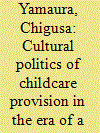

|
|
|
|
|
| Summary/Abstract |
The shortage of public childcare in Japan – called the “waitlisted children problem” (taiki jidō mondai) – has assumed increasing visibility and salience over the last several decades. This essay analyzes how this “waitlisted children problem” has been conceived, narrated, and addressed within the specific political, economic, and historical context that is contemporary Japanese society. Going beyond discussions of gender inequality in the workplace and home, the paper interrogates the cultural logics underpinning the recent urgency of debates over public childcare provision in Japan. The key to understanding these developments is recognizing how Japanese women's reproductive desires have become objectified within official and popular discussions as obstructed and requiring emancipation. Correspondingly, promoting gender equality by expanding childcare provision has become a tool of bio-political intervention, a means to remove a statistically calculated inhibition of women's reproductive desire. This links childcare with Japan's national survival, and thus helps to explain how both official and popular debates have converged in seeing the issue as significant and pressing.
|
|
|
|
|
|
|
|
|
|
|
|
|
|
|
|
| 2 |
ID:
183728
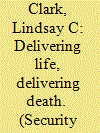

|
|
|
|
|
| Summary/Abstract |
Like all warfare, drone warfare is deeply gendered. This article explores how this military technology sediments or disrupts existing conceptualizations of women who kill in war. The article using the concept of motherhood as a narrative organizing trope and introduces a ‘fictional’ account of motherhood and drone warfare and data from a ‘real life’ account of a pregnant British Reaper operator. The article considers the way trauma experienced by Reaper drone crews is reported in a highly gendered manner, reflecting the way women’s violence is generally constructed as resulting from personal failures, lost love and irrational emotionality. This irrational emotionality is tied to a long history of medicalizing women’s bodies and psychologies because of their reproductive capacities and, specifically, their wombs – explored in this article under the historico-medical term of ‘hysteria’. The article argues that where barriers to women’s participation in warfare have, in the past, hinged upon their (argued) physical weakness, and where technology renders these barriers obsolete, there remains the tenacious myth that women are emotionally incapable of conducting lethal operations – a myth based on (mis)conceptions of the ‘naturalness’ of motherhood and the feminine capacity to give life.
|
|
|
|
|
|
|
|
|
|
|
|
|
|
|
|
| 3 |
ID:
184579
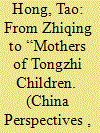

|
|
|
|
|
| Summary/Abstract |
This paper mobilises interactionist sociology to explore the biographies and moral careers of two former zhiqing who emerged, circa 2007, as well-known mother figures in a dynamic tongzhi blogosphere. Their encounter with young tongzhi inaugurated parental advocacy for their sexually nonconforming children in China. By anchoring tongzhi activism in contemporary Chinese history and reconstructing two parallel processes of activist-becoming, this paper seeks to better understand how political agency emerged in an authoritarian setting while making a case for studying activism as historicised meaning-making activities.
|
|
|
|
|
|
|
|
|
|
|
|
|
|
|
|
| 4 |
ID:
188184
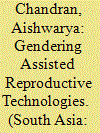

|
|
|
|
|
| Summary/Abstract |
Literature on commercial surrogacy argues that assisted reproduction technologies (ARTs) problematise presumed essentialist dichotomies of nature and culture. While technologies of commercial surrogacy naturalise the medicalisation of the body, these technologies in turn also produce new knowledge about the biological facts of the body. In what ways are knowledge about reproductive labour and women’s reproductive capacities embedded in these technologies? How do these technologies invite us to imagine maternal bodies? Under regimes of stratified reproduction that inflect reproductive bodies with caste, class and racial politics, how do we read the production of the gendered body within commercial gestational surrogacy practices? The paper draws on ethnographic research conducted in Mumbai to study how technologies of commercial surrogacy interact with the normative idioms of conception. I will attempt to show how assumptions about gendered bodies and gendered roles are embedded within the material teleologies of these technologies, which in turn produce newer material-semiotic significations of the reproductive body.
|
|
|
|
|
|
|
|
|
|
|
|
|
|
|
|
| 5 |
ID:
169776


|
|
|
|
|
| Summary/Abstract |
This research note interrogates the varied ways in which researcher and research subjects’ intersectional identities complicate multiple levels of access to research participants, specifically with respect to research I conducted with refugee women who returned to Liberia after the end of the civil war in 2003. I argue that motherland (or nationality) and motherhood (or maternity) produce ‘minefields’ during fieldwork that a researcher has to navigate in achieving different levels of access to research subjects, particularly in postconflict situations. While the literature mostly discusses these issues from the perspective of non-Africans conducting fieldwork abroad, this essay analyses issues arising from being a young, female Nigerian conducting research with women, mostly mothers, in the same African sub-region. It explains how being a young, married, pregnant, and mothering Nigerian facilitated or obstructed access to research participants. This foregrounds the complexity of the insider/outsider debate for researchers conducting fieldwork in various contexts, and thereby contributes to the wider literatures on feminist methodologies and qualitative fieldwork.
|
|
|
|
|
|
|
|
|
|
|
|
|
|
|
|
| 6 |
ID:
187745


|
|
|
|
|
| Summary/Abstract |
Writing in the Malay-language press from the late 1910s to the 1930s, literate women in colonial Java and Sumatra engaged deeply with understandings of modernity mediated through concepts of healthfulness and hygiene. Piecing together the views of writers who participated in conversations about health, child-rearing, child-feeding, and socio-political progress, and situating them against the backdrop of both imperial policies of hygienic modernity and systems of indigenous knowledge, this article argues that these women deployed their own agency and negotiation efforts to articulate a singular paradigm of progress. The article focuses on practices of infant-feeding, showing that these literate colonized women's conscious manipulation of the colonial discourse on scientific modernity was grounded in their awareness of the racial project of control of their own bodies. The promotion of ‘traditional’ breastfeeding was a way to affirm a path to progress that shared the underlying conditions for, but not the modalities of, Western modernity. Examining the processes of negotiation and subversion that emerged in these women's writings provides a productive space to question and reframe scholarly understandings of ‘modernity’ as a category of analysis.
|
|
|
|
|
|
|
|
|
|
|
|
|
|
|
|
| 7 |
ID:
113834


|
|
|
|
|
| Publication |
2012.
|
| Summary/Abstract |
California is the global hub for assisted reproductive technology practices, including egg donation. The rise of egg donation in the United States is surprising given the cultural context linking genetics and motherhood and rejecting the commodification of reproduction. Scholars in the hostile worlds camp have grappled with the relationship between intimacy and economics, yet employing this theory to explain the increase in egg donation is unsatisfactory. The concept of relational work, developed by Viviana Zelizer, provides scholars with a robust analytical tool to account for the rise in egg donation. This paper analyzes the relational work of egg donors and fertility center staff. I argue that donors and staff construct an understanding of egg donation that avoids directly challenging the cultural context mentioned above. Analyzing egg donation as a case of relational work demonstrates the need to move beyond the reciprocity/market dichotomy upheld by the hostile worlds framework.
|
|
|
|
|
|
|
|
|
|
|
|
|
|
|
|
| 8 |
ID:
189416
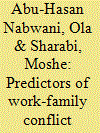

|
|
|
|
|
| Summary/Abstract |
This article compares work-family conflict (WFC) among more than 2000 married Israeli Jewish and Arab women. The data was taken from Israel Social Surveys and included varied life-course variables that allowed to explore in depth relationships between WFC and family formation. Our findings reveal that Arab women experienced WFC more than Jewish women. Delaying first marriage and first birth and having more children are related to higher WFC. Furthermore, WFC was associated positively with women’s wage and work experience. The implications of the research and recommendations for public policymakers are discussed.
|
|
|
|
|
|
|
|
|
|
|
|
|
|
|
|
| 9 |
ID:
114592


|
|
|
|
|
| Publication |
2012.
|
| Summary/Abstract |
This article explores the way in which female agency in political violence is enabled through gender. It looks at two examples of heroine stories - the cases of British Navy sailor Faye Turney and the popular film Female Agents (2008) - to illustrate how female agency in political violence is constructed at the expense of motherhood. The article argues that representations of female agency in political violence involve a tension between a life-giving and a life-taking identity, and that agency is only enabled if this tension is removed or overcome. This suggests that heroism, as agency in political violence, is in a symbiotic relationship with motherhood: heroism functions as motherhood's constitutive other and vice versa. This means not only that the writing of heroines depends on ideas about female bodies' association with motherhood but also that essentialist ideas about gender are reinforced. Accordingly, this article suggests that female agency in political violence is communicated and negotiated through motherhood, even in cases where this might not be immediately apparent.
|
|
|
|
|
|
|
|
|
|
|
|
|
|
|
|
|
|
|
|
|